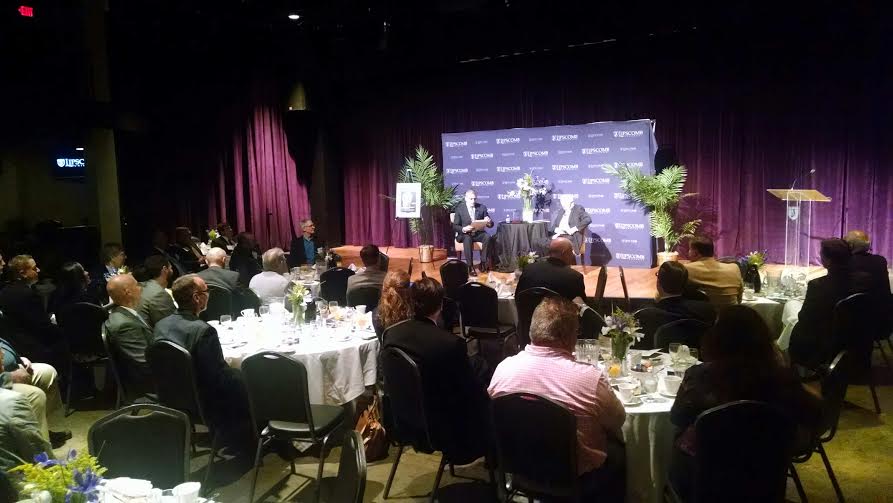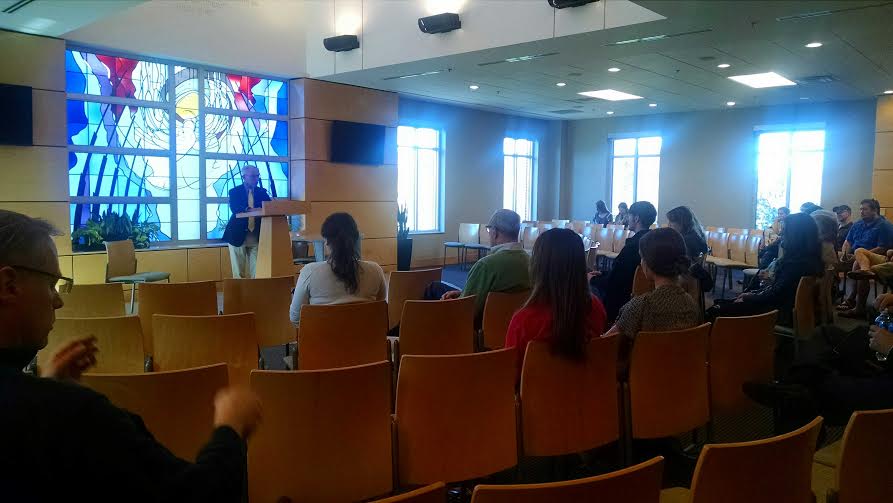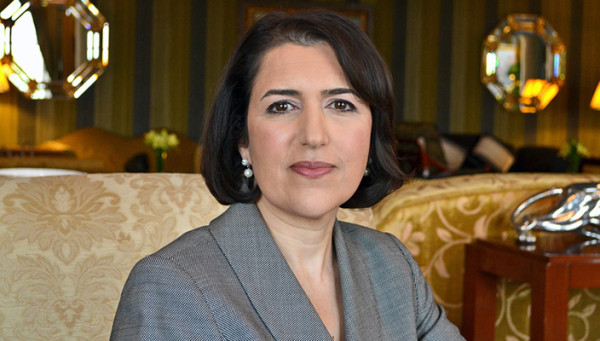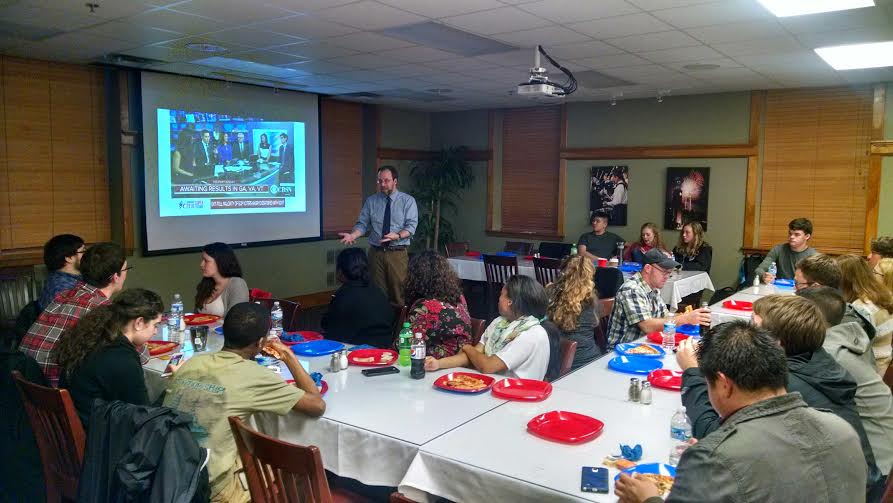
by Brianna Langley | Apr 21, 2016 | News Slider
Local business leaders, professors and students gathered in Shamblin Theatre Thursday morning for the purpose of honoring Donald S. Freeman, Jr. as the 2016 recipient of the Lipscomb College of Business’ Heroes of Business Award. Attendees were offered breakfast, coffee and a short presentation by Freeman, during which he addressed his experience at the U.S. Naval Academy, the intricacies of operating a family-owned company and advice for students regarding ethical business practices. “My experience here at Lipscomb has just been spectacular,” Freeman said. “I’ve met some wonderful people and really enjoyed visiting with the students.” Business students particularly appreciated having the opportunity to interact with a prominent business leader on a personal level, according to business student Josiah Lockard. “Events like this really show the investment that Lipscomb puts back into its students,” Lockard said. “It’s more than just an education here; it’s a mentorship.” When Freeman resigned his commission in the Navy in 1964 to join the business his father had founded, Freeman Decorating Company, he became manager of the Des Moines branch in Iowa. Freeman resigned his commission in the Navy in 1964 and joined the business his father had founded, Freeman Decorating Company. He became the manager of the Des Moines branch in Iowa. By 1972, Freeman became president of the company before naming his son-in-law Chief Operating Executive in 2008. Today, Freeman continues to serve the family business as chairman. “One piece of advice I’ve thought of over the years revolves around the issue of patience,” Freeman said during his presentation. “I always feel like there’s time to make the right decision. You should never feel rushed into...

by Brianna Langley | Apr 13, 2016 | News Slider
Author and journalist Thomas Lippman addressed American interests in the Middle East in Doris Swang Chapel on Lipscomb’s campus Tuesday, April 12. “Frankly, I enjoy audiences that have done their research and ask questions based in some knowledge much more than those I have to teach Islam-101 to,” Lippman said. “I certainly found the more preferred audience here at Lipscomb.” Lippman served as the Washington Post’s correspondent in the Middle East for a number of years and has written two books regarding Middle Eastern political climates: Inside the Mirage: America’s Fragile Partnership with Saudi Arabia and Hero of the Crossing: How Anwar Sadat and the 1973 War Changed the World. In his public affairs briefing, Lippman spoke on the origins of instability in the Middle East, such as historic rivalries and collective grievances. “I’m sure you’ve all heard the saying, ‘those who forget the past are doomed to repeat it,’” Lippman said during his presentation. “Well, in the Middle East, the opposite is true. Those who don’t forget the past are doomed to repeat it because that’s how deep these cross-generational grievances are.” Lippman took attendees through a timeline of the year 1979 in the Middle East. The events that took place during that monumental year are large contributors to the current situations we see today in that region, according to Lippman. Lippman began by addressing the Iranian Revolution of January, 1979 and concluding his calendar rundown with the Soviet invasion of Afghanistan in December of 1979. The briefing was attended by students, university faculty and community members, and was co-hosted by the Tennessee World Affairs Council. “We’re so...

by Brianna Langley | Apr 6, 2016 | News Slider
1.8 million. That’s how many foreign refugees the Iraqi portion of the Kurdistan region cares for. A region of about 15,692 square miles and only 5 million native people has found itself with an extra 1.8 million people seeking refuge. According to Kurdistan Regional Government Representative to the United States Bayan Sami Abdul Rahman, Kurdistan’s volunteer army, the Peshmerga is fighting for the Kurdish cultural tradition of equality and freedom rather than for Iraq or ISIS, despite a severe lack of resources. “Today because of the economic crisis we have in Kurdistan, many Peshmerga are not paid for five months at a time,” Rahman said. “They’re facing great financial hardship and their families find it difficult to pay the rent and put food on the table, and yet the Peshmerga still continue to fight against ISIS.” In 2014, ISIS attempted to attack and take control of Kurdistan Region’s capital of Erbil. It engaged in a campaign of genocide against several religious and ethnic minorities. “Fortunately, at that moment in 2014, President Obama ordered airstrikes and the airstrikes changed everything,” Rahman said. “We knew the United States was with us and would not leave us to face ISIS alone.” Since August 2014, the Peshmerga has been able to push ISIS out of all the Kurdish areas of Iraq, with the help of U.S. airstrikes. Although the United States and coalition forces continue to provide weapons and training to the Peshmerga, Rahman has asked the government on behalf of Kurdistan for more advanced weaponry and direct military trade. “We are carrying very light weapons. We cannot fight against tanks and armed vehicles with this kind of weaponry,” Rahman said. “So we’re asking for...

by Brianna Langley | Mar 2, 2016 | News Slider
In honor of Super Tuesday’s political primary elections, students from across various departments gathered in the faculty dining room in Bennett Student Center to talk politics. The event was hosted by political science professors Marc Schwerdt and Susan Haynes. “I think it’s important that this university is fostering a sense of democratic responsibility within students,” said senior Daniel Delbasto. “At the university level, you have to push for events that give students the chance to voice their positions and debate and then go home and research because they are intrigued.” Tuesday’s event was entitled “Pizza and Politics,” and as the name suggests, the night provided students with an opportunity to enjoy pizza and political conversation as CBS news channel delivered polling results on a big screen projector. The election result showed Donald Trump in the lead for the Republican ballot with 221 delegates and Hillary Clinton in the lead for the Democrat ballot with 426 delegates. “I’m very glad Lipscomb decided to hold this event because I enjoy being around people who share a love for politics, even if we don’t agree on who our favorite candidate is,” said Lipscomb junior Irish Furbush. “It’s just nice to be around people who can bounce ideas off of each other as we see the polling results come in.” The event not only provided election discussion but also gave the political science professors the chance to get to know students outside the department. “We want to use events like this as platforms to make students aware that the political science department is a resource here, because the more students we meet who are...

by Brianna Langley | Mar 1, 2016 | News Slider
The League of United Latin American Citizens (LULAC) is the largest and oldest nationwide Hispanic civil rights organization in the United States. Founded in 1929, the league has never had a Tennessee-based chapter until last semester when the very first one was created on Lipscomb’s campus. A group of Latin-American students brought their interest in LULAC to the attention of Dean of Intercultural Affairs Lisa Steele last semester. After researching the organization, Steele decided “it was something that would be worthy of Lipscomb students’ attention.” “I just feel so empowered because LULAC is really a culmination of all the passions that I have personally as far as civil justice, civil rights, the Hispanic community and providing a voice for minorities,” junior LULAC student Jacky Gomez said. “LULAC really encompasses all of that and I see a lot of potential to grow because it is a national organization and it is recognized.” This past week, eight of Lipscomb’s LULAC students traveled to Washington, D.C. for LULAC’s Emerge Conference, a four-day seminar specifically for collegiate LULAC members. “The Emerge Conference is an annual event where Hispanic students from all the different states come together to discuss policies like healthcare and how it’s affecting the immigrant community currently,” junior LULAC student Jhoselin Revolorio said. “We also talked about economics, education and immigration reform and got to listen to different representatives and congressmen who had different points of view.” Not only did Lipscomb LULAC students get a chance to hear from policymakers, but they also had the opportunity to talk to them, according to senior Carlos Ruiz. “We talked to people from the department of...






